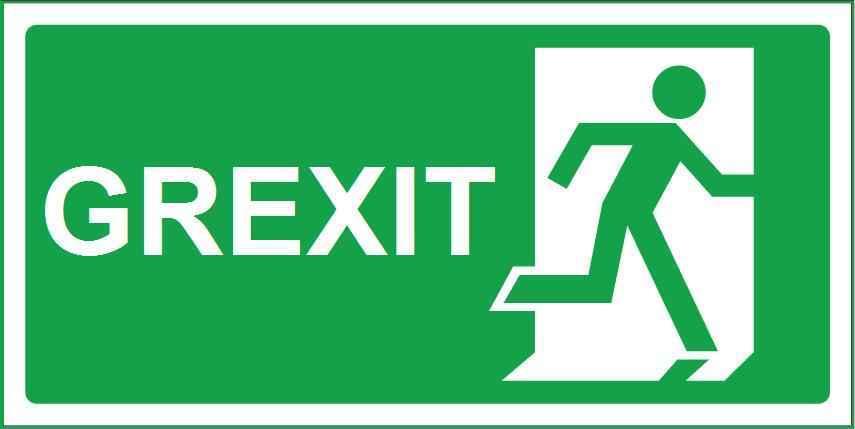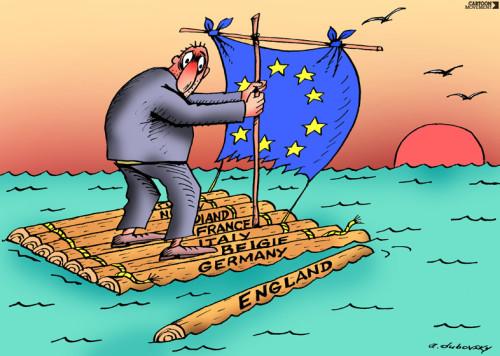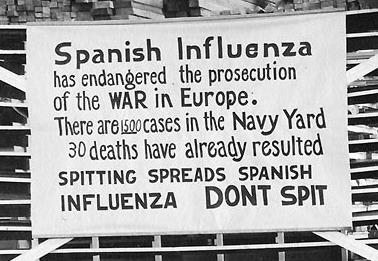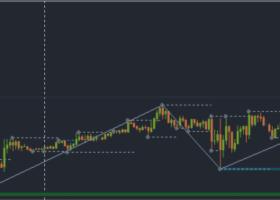The Investor is an Endangered Species: Exit EU Edition
There are plenty of reasons for investors
to be cautious again. We had a rugged start to 2016 as a prelude to what
was to come this year amidst a dire macro outlook from Global wars and a
European refugee crisis, China, through a glut in commodities,
overstretched EM's and a strong U.S. dollar, defected Central Bank
policies and even the possibility of a break-up of the European Union.
O.K.
that last hazard may sound a little far-fetched and hard to swallow,
but one can't help get realistic as to the implications, whether it be a
Brexit or a Grexit on a more radical level. But, let us have a look
around this panorama of European referendums and what it all might mean
for investors and the FX space this summer.
The probability of Grexit lives on ... To be continued ... in a land not so far, far away ...

Source: The Daily Journalist
First,
we had the nail-biting Grexit campaign during 25% unemployment in Greece
and unsustainable debt-liabilities occurring from the official
financial crisis starting in May 2012 in the making of 'Plan Z' (a
detailed script made by a small group of EU and International Monetary
Fund officials of how to reconstruct Greece's economic and financial
infrastructure if it were to leave the euro).
The Greek
referendum finally took place on the 5th of July 2015 with the "No"
vote winning in all of Greece's regions. However, shortly after, on
Monday, 13 July, the Syriza-led government of Greece then went ahead and
accepted a different bailout package that contained larger pension cuts
and tax increases than the one rejected by Greek voters in the
referendum in the first place, and now, after three emergency bailouts
and the largest debt restructuring in history, we are looking again at
the possibility of the debt-ridden country falling out of the currency
union.
Britain is just a small island that no-one pays attention to - really?

Source: Politico
An unnamed Russian
official once dismissed Britain as "just a small island". That maybe the
case, but there is plenty of attention being paid to the prospects of a
Brexit.
When back in 2014, and within all the Greek malaise,
Britain was also made to look 'out of sorts' in the wake of the Scottish
independence referendum. This too carried all sorts of major economic
issues and implications should the Yes camp had been the simple majority
of the vote.
The independence referendum question, which voters
answered with "Yes" or "No", was "Should Scotland be an independent
country? This took place on the 18th September 2014. In the biggest
turnout recorded, (84.6%), for an election or referendum in the United
Kingdom since the introduction of universal suffrage, the "No" side were
victorious, with 2,001,926 (55.3%) voting against independence and
1,617,989 (44.7%) voting in favour. That is essentially still a close
looking call and is subject to a revival of such a vote in times to
come, especially given the Brexit referendum that is now just next
month.
Return of the 'Spanish flu'? - Spain sneezes, we all catch a cold?

Source: Eye On Spain
In the
background of all of the above, and not driving as much heat in
financial markets, yet, is Catalonia's push for independence from Spain
at a time when a disillusioned Spain still has no government months
after their general election.
While Spain has been considered
relatively lesser and immediate problem than Greece or Britain, I can't
help be reminded how influential Spain was to the global economy back in
1918 when 500 million people across the world were infected with the
Spanish flu that resulted in the deaths of 50 to 100 million, or three
to five percent of the world's population, making it one of the
deadliest natural disasters in human history.
O.K., that is
rather abstract, but do not undermine the ramifications that could come
of the absolute lack of stability and certainty in a major EU country
such as Spain that is still recovering from the great financial
recession of 2007/08, especially at a time when Europe faces a series of
serious issues, touched upon above in the influx of refugees,
terrorism, Eurozone instability, Brexit/Grexit, Syria, and Russian
aggression in Ukraine and as well as the Baltics which all-together add
to the feeling of immense uncertainty.
When Catalan nationalists
held an unofficial poll in November 2014, 80% of those who voted backed
independence. After a freeze on the matter since and after a long period
of political deadlock, Catalan independence was put back on track this
year as a new leader was sworn in.
Carles Puigdemont, the mayor
of Girona, as head of a majority separatist Catalan parliament has
restarted the push for a unilateral declaration of independence.
Catalans are roughly divided 50-50 over whether to secede from Spain,
but they're overwhelmingly in favor of voting on the question while
Spain's leadership vacuum in Madrid is damaging Catalonia and Europe.
So,
on the 26th of June, Spaniards will be asked to vote in another
general election, while otherwise, four large parties seem unwilling to
form a new government after December's inconclusive elections.
What does this all mean for a summer of FX?

So, as one can read, we are on a rocky and
treacherous political road ahead in Europe underpinning risk-off
markets, and that coupled with the recently unveiled failings of Central
Bank policies in Japan and America (in one's own opinion), you can bet
your bottom dollar on intensified volatility in the FX space to come
for this summer in 2016.
I would say we are looking for an
initial weakening in the U.S. dollar still that has more downside to go
with a number of lines in the sand crossed over in USD/JPY
to the downside as Japanese stocks continue to flounder, a stronger
environment and recoveries in commodities, gold specifically, and EM's
while the Fed's window of opportunity to hike rates this year is
narrowing rapidly.
As for the euro and pound, Brexit polls are a
virtual dead heat, so EUR/GBP remains better bid for the meantime as
more risks are associated to Britain than the EU at this stage.
However,
that is all subject to change longer-term as questions come in to play
as to whether the EU can survive all of the above not to mention further
negative implications that would follow an actual Grexit, Brexit or
even a Frexit with MORE than half of French voters now wanting their own
referendum on EU membership and as such, underpinning fears in Brussels
that a Brexit could topple the 28-country bloc.
Britain's
referendum is on the 23 June and the Spanish general election will be
held on following Sunday the 26 June and while the Spanish parliamentary
majority are in-fact supporting an 18-month road-map for Catalonia's
independence of Spain.



